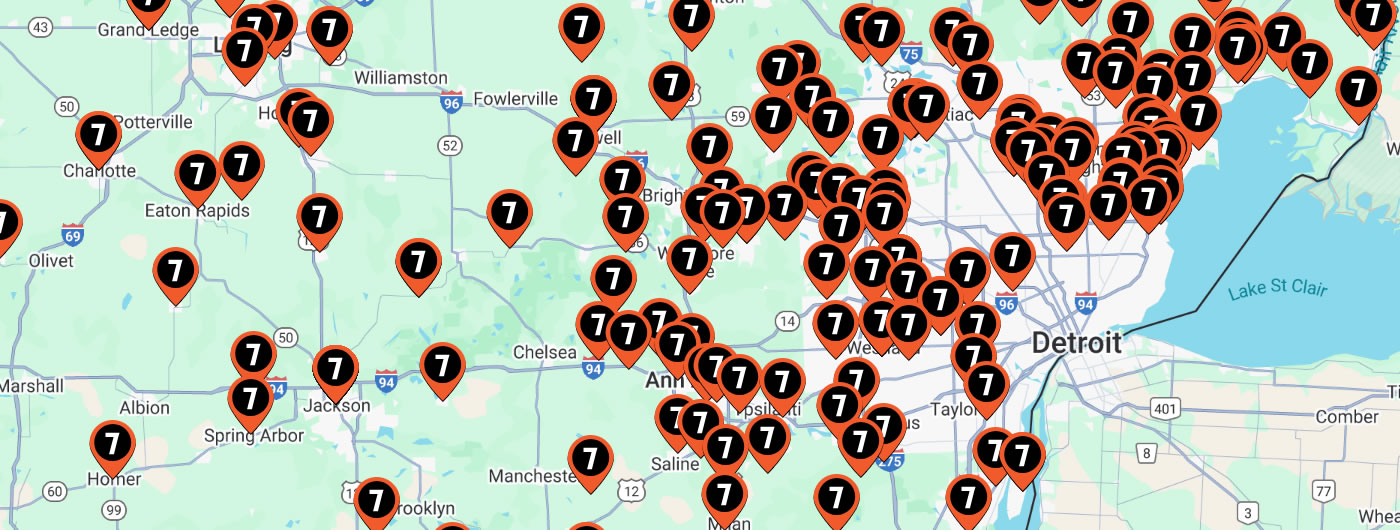America is awash in gun manufacturers – yet few actually manufacture any guns.
According to the Bureau of Alcohol, Tobacco, Firearms and Explosives (ATF), the government agency charged with enforcing our nation’s federal gun laws, in 1975 the agency issued only 364 Type 07 Federal Firearms Licenses (FFLs), the basic federal license required to manufacture guns in America. By 2023, this number had soared to 19,997 ─ an increase of more than 5,300 percent.1
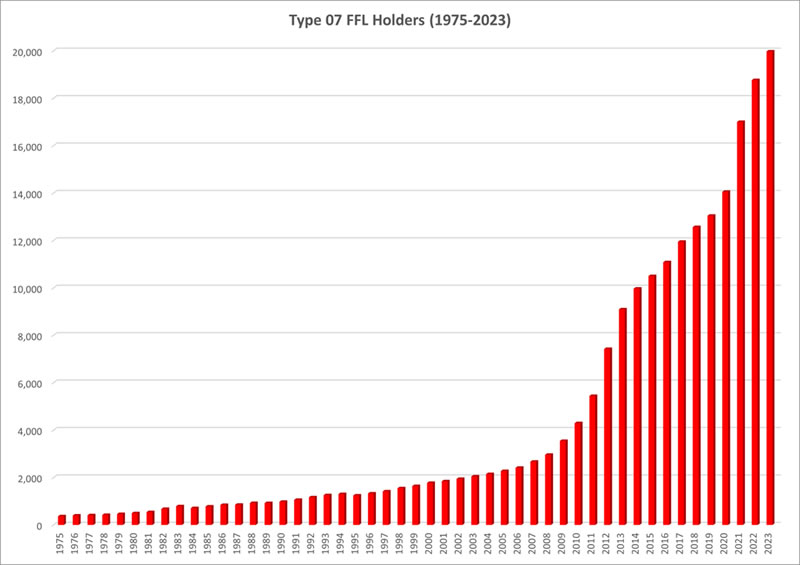
Yet, the majority of the “gun manufacturers” who possess the Type 07 license do not manufacture firearms in the commonly understood sense. Instead of a commercial manufacturing facility, they operate out of their homes, offices, or unrelated businesses — with a significant portion of license holders never even reporting the production of a gun to ATF.
For example, nationally in 2022,2 according to data contained in ATF’s Annual Firearms Manufacturers and Export Report (AFMER):
- Seventy-six percent (11,684 of 15,445) of Type 07 license holders did not report producing any guns that year.3
- Of the Type 07 license holders who did report producing guns that year, 53 percent (1,995 of 3,761) reported producing 10 or fewer firearms.4
- Combined, Type 07 license holders who did not report producing any guns and Type 07 license holders who reported producing 10 guns or fewer that year represented 89 percent of all Type 07 license holders.5
In Michigan in 2022,6 according to data contained in ATF’s Annual Firearms Manufacturers and Export Report (AFMER):
- Seventy-six percent (324 of 425) of Michigan Type 07 license holders did not report producing any guns that year.
- Of the Type 07 license holders who did report producing guns that year, 55 percent (56 of 101) produced 10 or fewer firearms.
- Combined, Type 07 license holders who did not report producing any guns and Type 07 license holders who produced 10 guns or fewer that year represented 89 percent of all Type 07 license holders.7
Nationwide, in just the five-year period from 2019 to 2023, the number of Type 07 FFLs increased by 52 percent ─ from 13,125 to 19,997 license holders.8
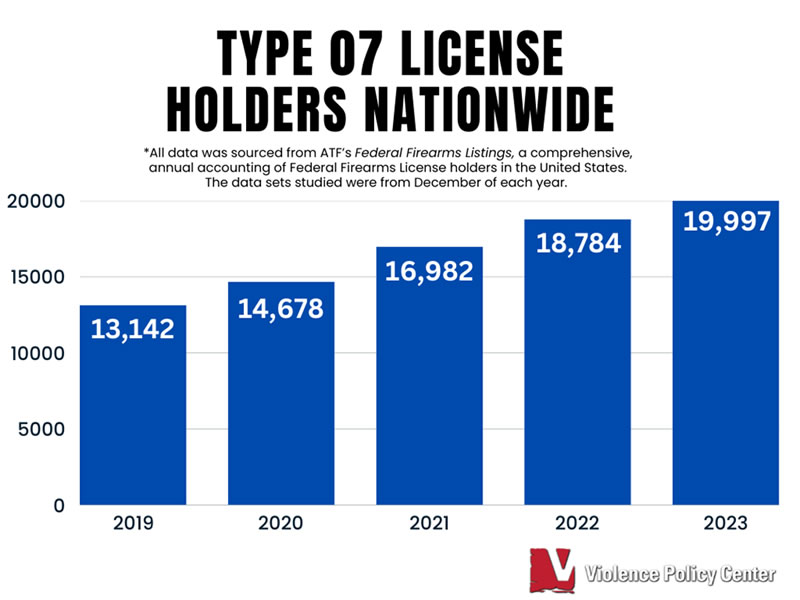
In Michigan for this same period, the number of Type 07 FFL holders increased by 67 percent ─ from 310 to 518 license holders.9
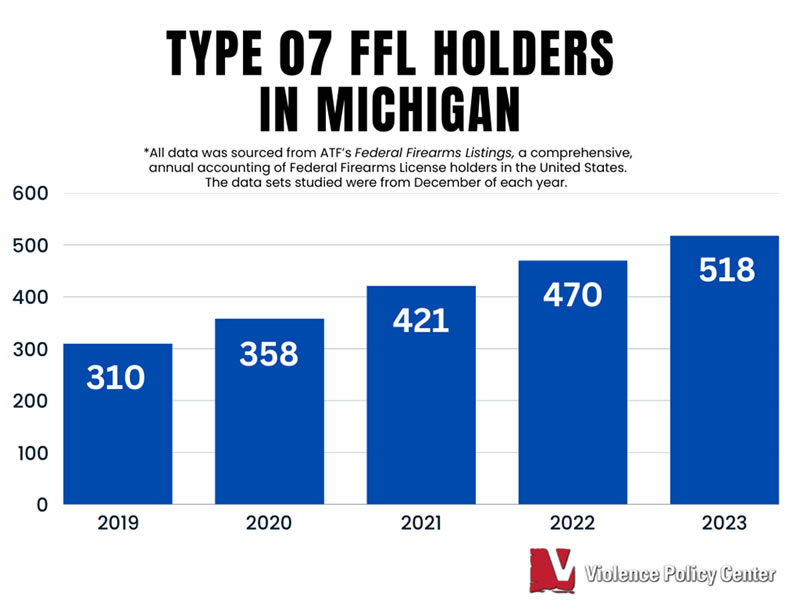
So, if a significant number of these license holders aren’t manufacturing guns, what are they doing? The honest answer is that no one really knows. But if history is any guide, most likely they’re being used by license holders to evade a range of firearm regulations that apply to unlicensed private citizens.
The Appeal of the Type 07 FFL
The Gun Control Act of 1968 (GCA) established the current federal licensing system for manufacturers, importers, wholesalers, and dealers of firearms. Under the GCA, any person “engaged in the business” of making or selling firearms must be licensed by ATF.10
The ATF graphic below describes the nine types of Federal Firearms Licenses (FFLs) issued by the agency.
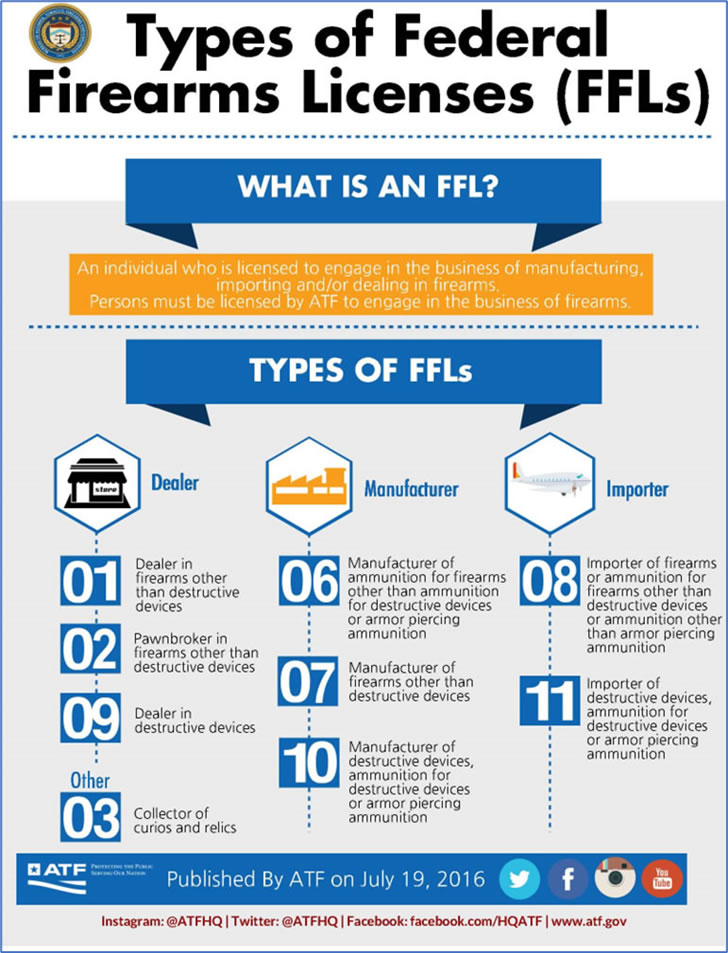
Both the Type 01 FFL dealer’s license (the basic license to sell firearms other than destructive
devices11 12) and the Type 07 FFL manufacturer’s license (the basic license to manufacture firearms other than destructive devices) exempt the license holder from many of the restrictions on the sale and transfer of firearms that private citizens are subject to under the Gun Control Act. Unlike ordinary citizens, these license holders can:
- buy and sell firearms in interstate commerce and receive firearms via common carrier;
- purchase firearms from wholesalers at discount and in unlimited quantities; and,
- bypass requirements that apply to unlicensed individuals, such as background checks.
In addition, by paying an annual “Special Occupancy Tax” (SOT) a Type 07 license holder, in addition to manufacturing standard firearms, can also manufacture weapons and firearm accessories that come under the more restrictive regulations of the National Firearms Act of 1934 (NFA), such as fully automatic machine guns and firearm silencers.
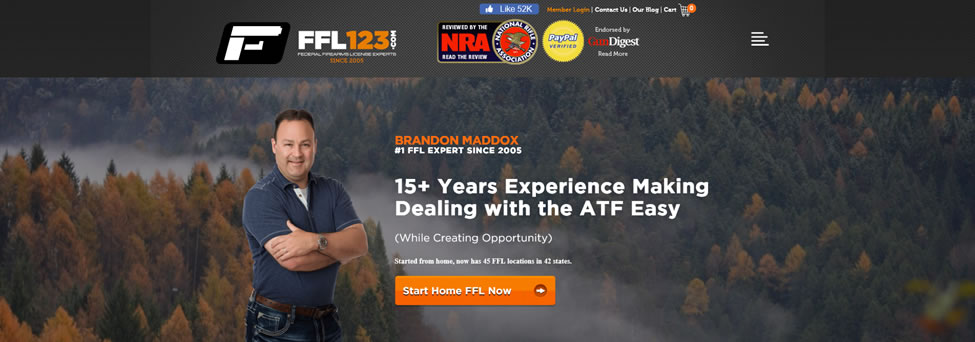
According to the “federal firearms license experts” at FFL123,13 a commercial site that sells online kits that cater to private citizens who want to obtain an FFL (most likely for personal use):
The Type 07 FFL is the most powerful and popular FFL to get. With it you can do everything a Type 01 FFL can (buy, sell and repair firearms) plus manufacture guns and ammo. When you add a Class 03 SOT to this license you can also make NFA items like silencers and even machine guns!14
The fee for a Type 07 FFL is $150 to apply and $150 to renew every three years. The annual Special Occupancy Tax (SOT) for the Type 07 License is $1,000 per year.15
FFL123 also promotes the Type 07 license with an SOT as a way for the license holder to undercut the 1986 ban on the private possession of new machine guns. In May 1986, Congress banned the production of new machine guns for civilian sale (private citizens can, however, purchase pre-1986 machine guns under federal law if they meet the heightened sale and possession standards of the NFA as well as state and local laws). The Type 07 license (like the Type 01 license) combined with the SOT allows the possessor access to new, post-1986 machine gun “samples,” ostensibly for law enforcement or similar sales or review.16
As FFL123 trumpets, “In fact, this is the most common way to gain access to post May 1986 machine guns and combine business with pleasure!”17
However, with the Type 07 license, the license holder can also build their own machine gun for what can be, in reality, personal use. In a July 2021 blog titled “Who Can Own a Full-Auto Machine Gun?,” FFL123 owner Brandon Maddox, ─ noting that “You might think that this sounds shady, but it’s not” ─ enthusiastically answers his own question as seen in the extended quote below:
Who can own a full-auto machine gun? Well, the simple answer is: you! You can own a machine gun. Yes, that’s right. It’s perfectly legal for you to own a machine gun! They are not some mythical object made up of Unobtainium…
Under current law, only government agencies can acquire newly-made machine guns – but they still need dealers to buy them from and manufacturers to make them.
Sales of such guns go through FFL gun dealers with either an 03 SOT (retail sales of NFA items with an 01 or 02 FFL) or an 02 SOT (manufacturing of NFA items with an 07 or 10 FFL).
Here’s where it gets interesting…
An 03 SOT needs a letter from a law enforcement agency asking to see a particular machine gun demonstrated. This is called a demo letter, and the gun is called a dealer sample. Only 02 and 03 SOTs can acquire dealer samples, and only with a demo letter. Once you allow the agency to examine the gun, it is yours to keep as long as you maintain your SOT. Many SOT holders acquire demo guns from friendly local law enforcement requests.
However, if you cannot get a demo letter, an 03 SOT gun dealer has no other way of acquiring a machine gun. If you are an 02 SOT, though, you are legally allowed to build as many machine guns or other NFA devices as you wish (following a certain procedure, of course) and may retain them for as long as you maintain your SOT.
That’s right: you can build a machine gun (full-auto machine gun) legally and keep it for as long as you wish and are in business!
Too Good to Be True?
You might think that this sounds shady, but it’s not. As long as you are conducting legal business, there are all sorts of reasons to build legal machine guns, including proof of concept, experimentation, range rentals, demo guns, movie prop rentals, and more. Along the way, as an incidental to doing business, there is absolutely nothing wrong with enjoying the machine guns you have built or acquired. In fact, it would be stupid not to do so!18
FFL123 also notes that “ATF inspectors can only come to inspect during ‘business hours.’ They can only inspect once every 12 months. Do not expect an inspection but once every 20 years, as we understand that is their average.”19
This is not an exaggeration. For fiscal year 2021, only five percent of FFL holders (6,643 out of 134,516) were subject to ATF firearm compliance inspections.20 As a result of these 6,643 compliance inspections, only 149 inspections (two percent) resulted in “warning conferences.” Thirty-one FFL holders had their licenses revoked by ATF — less than one percent of the FFL holders that were inspected (0.47 percent).21
At the same time, whether these license holders are meeting state and local zoning regulations, business licensing and other regulations, or any other related fees or requirements remain an open question.
The stark reality is that in states across America – including Michigan ꟷ an unknown number of communities are home to “kitchen table” gun manufacturers that are mostly hidden from public view, as the snapshots contained in the next section illustrate.
The Gun Manufacturer Next Door
For this study, the VPC conducted a series of analyses of the state’s 425 Type 07 license holders in 2022. As part of this process, the VPC identified Michigan gun manufacturers who produced 10 guns or fewer that year. While only a snapshot for a specific period in time, the data offers a window into the prevalence of Type 07 license holders in residential areas in the state. As of January 2025, ATF’s list of FFL license holders still lists the pictured structures as the license holder’s place of business.
The review revealed that while the majority of FFL holders’ place of business appear to be non-residential structures, a not insignificant portion appear to operate out of homes, in a residential neighborhood, with no easily discernable signage. It is highly unlikely that the presence of the manufacturer would be known by local residents or passersby from sight alone. Other sites include unrelated commercial entities.
The hidden nature of these gun manufacturers is all the more important keeping in mind the unique privileges granted the Type 07 license holder as detailed throughout this report.
For the year 2022, the VPC found that only 24 percent (101 of 425) of Type 07 license holders in Michigan reported manufacturing any guns that year. Of the license holders that did manufacture guns, 55 percent (56 of 101) manufactured 10 guns or less.
For this group of 56, using each license holder’s publicly available “place of business” address, we then utilized Google Earth to identify the structure associated with the “place of business.”
Below is the “place of business” for SUPERIOR CUSTOM FIREARMS LLC which manufactured one rifle in 2022 and is located in Sault Ste. Marie, Michigan, near an elementary school.
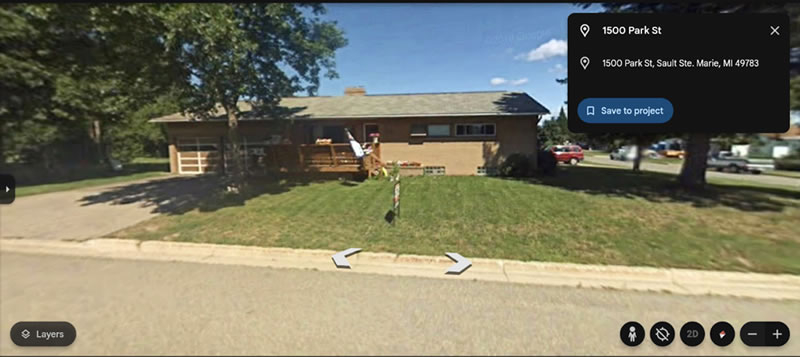
Below is the “place of business” for MIDWEST MOUNTAIN HUNTER LLC which manufactured eight rifles in 2022 and is located in Howell, Michigan.
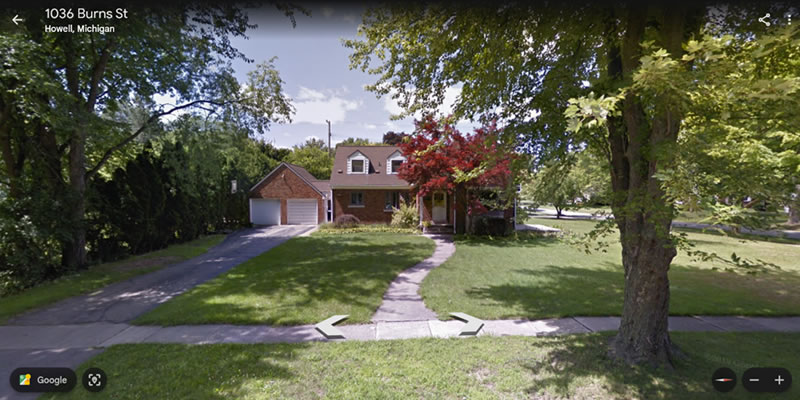
The slide show below shows the “place of business” for Michigan Type 07 license holders who manufactured 10 or fewer firearms who appear to be operating out of a residential structure.
While the slideshow above reviews Type 07 license holders who actually reported manufacturing firearms, as noted earlier the vast majority of license holders did not. And like their gun manufacturing brethren, a significant number of these license holders are also located in homes in residential neighborhoods. The collage below offers a series of examples as identified using Google Earth.
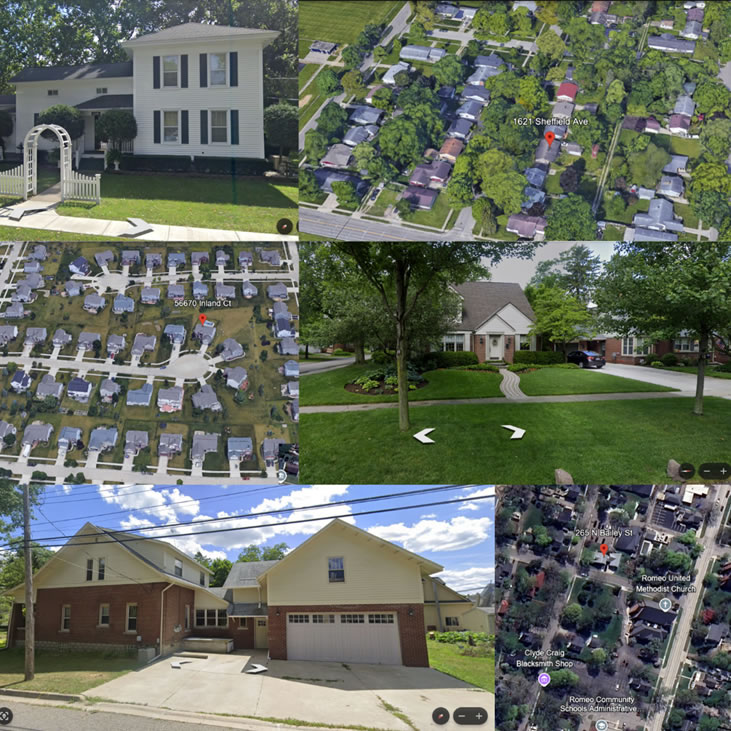
And although these license holders reported no firearms manufactured, they can, as noted earlier, buy and sell firearms in interstate commerce and receive firearms via common carrier; purchase firearms from wholesalers at discount and in unlimited quantities; and, bypass requirements that apply to unlicensed individuals, such as background checks.
Michigan Regulations
As in other states, the first step to becoming a firearms manufacturer in Michigan is to obtain a Type 07 Federal Firearms License (FFL). Federal law requires that applicants for any type of FFL must certify that their business will comply with all applicable state and local laws. Specifically, ATF states:
The business to be conducted under the license is not prohibited by State or local law in the place where the licensed premise is located; within 30 days after the application is approved the business will comply with the requirements of State and local law applicable to the conduct of the business; and the business will not be conducted under the license until the requirements of State and local law applicable to the business have been met; and that the applicant has sent or delivered a form to be prescribed by the Attorney General, to the chief law enforcement officer of the locality in which the premises are located, which indicates that the applicant intends to apply for a Federal firearms
license.22
While there are no special licensing requirements for Michigan FFL holders, license holders in Michigan must comply with the state’s business registration requirement.
As part of this report, the VPC utilized Michigan’s Licensing and Regulatory Affairs (LARA) database to identify Type 07 license holders that were listed as having obtained a state business license.
The VPC reviewed the LARA database in September 2024 and found that among Michigan Type 07 FFL holders in 2022 (the most recent year for which license information and firearm production data was available at time of writing):
- Twelve percent (51 out of 425) of Michigan Type 07 license holders were not listed as having a business license.
- Eleven percent (six of 56) of the Michigan Type 07 license holders that reported manufacturing 10 or fewer firearms were not listed as having a business license.
- Thirteen percent (43 out of 324) of Michigan Type 07 license holders who reported manufacturing zero firearms were not listed as having a business license.
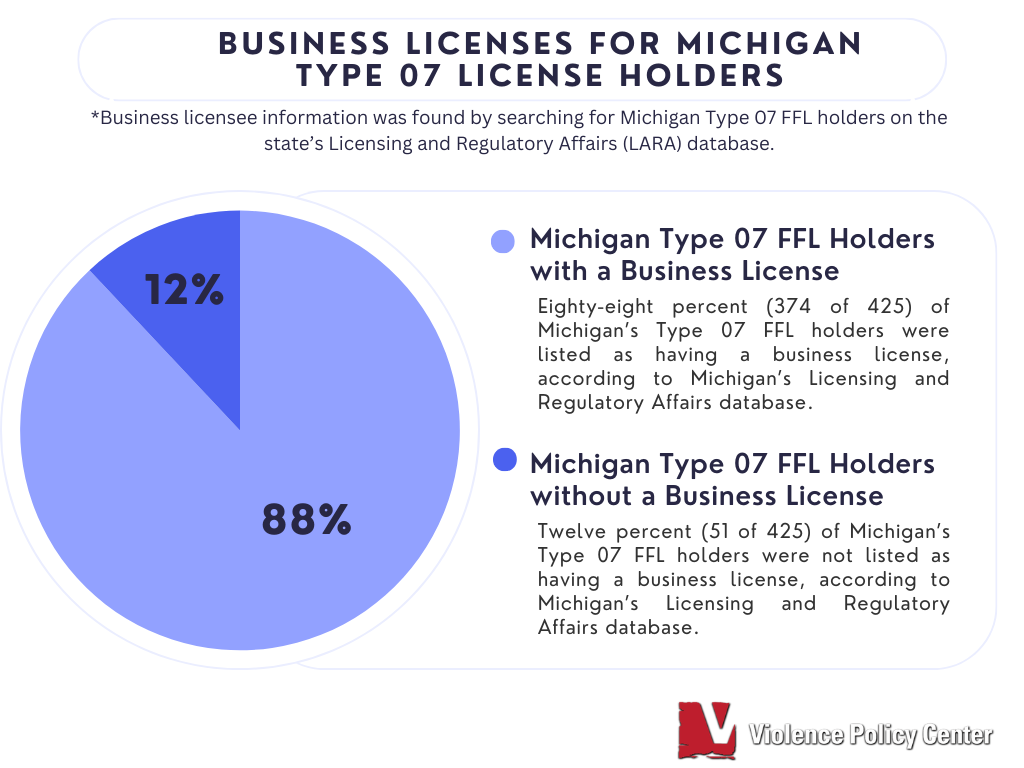
In addition, FFL holders must also comply with local zoning regulations. RocketFFL, another website that offers advice to those wishing to become a home-based federally licensed dealer or manufacturer, observes:
The biggest hurdle for most Michigan FFLs is local zoning requirements. You must ensure the location you use as a base of operations (often a home-based FFL) allows for a business. A home-based FFL business will often be told it can’t operate in a residential area due to a misunderstanding about the type of business activity held there. When a zoning department hears “FFL,” they may assume regular retail business and heavy foot traffic. Still, most home-based FFLs don’t have retail-level traffic and only have occasional visits from customers.23
Another site, the aforementioned FFL123.com, offers advice on the advantages of operating a home-based FFL in Michigan:
One of the most popular reasons to get a Michigan FFL is to operate as a home based or “kitchen table” FFL. These sorts of Michigan FFL’s are popular for two very simple reasons. One is the chance to make a decent part time living selling guns out of your home or garage. After all, if your neighbor can sell essential oils at home, why can’t you sell guns?
The other is the chance to access guns at wholesale costs for your own use incidental to your regular business operations. Home based Michigan FFL’s can save up to 30 percent off retail gun prices, and can both build a profitable part time business, and grow their gun collection at the same time. In order to get a Michigan FFL to run a home based FFL, you really don’t have to do a lot. Most cities and counties allow for light retail operations in most residential areas. FFL123 makes a specialty out of helping people get their home FFL’s, and can help guide you through tricky zoning and licensing issues.24
The same website offers this advice regarding gun manufacturing in Michigan:
In more rural settings, you may even be able to do light manufacturing at your residence. Imagine being able to legally build silencers and even machine guns in your rural barn! What a great reason to get a Michigan FFL.25
Unfortunately, unlike the centralized, online information available through LARA for those who do or do not possess a business license, zoning enforcement is conducted on the local level.
In addition to the state business licensing and zoning requirements outlined above, in 2024 Michigan enacted new laws regarding the safe storage of firearms and related safe storage requirements that may apply to manufacturers.26
Manufacturing NFA Firearms
As noted earlier, in order to manufacture firearms regulated under the National Firearms Act (NFA), a category that includes silencers and machine guns, Type 07 FFLs must pay a special occupational tax (SOT)27 and register with ATF as a Class 2 SOT.28
Rocket FFL tells applicants, “The really cool thing about a Class 2 SOT is that it doesn’t just allow an FFL to manufacture NFA Firearms, it also allows that FFL to also deal/sell those firearms.” The website also boasts that, “Class 2 SOTs can make a machine gun whenever they want (no LE [law enforcement] letter needed), however, machine guns are only supposed to be made for potential law enforcement or government sales/use.”29
An opinion issued by the Michigan Attorney General determined that “only those persons receiving the proper authorization from the appropriate federal officials are allowed to manufacture, sell, or possess a machine gun.” It is therefore legal for Michigan residents to own machine guns, but only if it was lawfully possessed before May 19, 1986, and is properly registered under federal law. A person in Michigan may only transfer possession of a machine gun if authorized to do so by the federal Director of the Bureau of Alcohol, Tobacco, Firearms and Explosives.30
It is also legal for Michigan residents to manufacture or possess a silencer if the person is licensed or approved to possess, manufacture, or sell such a device by the federal Bureau of Alcohol, Tobacco, Firearms and Explosives.31
Is There a Gun Manufacturer Next Door to You?
In conjunction with its research on the illegitimate possession of Type 07 FFLs, the Violence Policy Center developed an online tool that allows the user to enter their home (or any) address to see if there are any Type 07 federally licensed gun manufacturers near them. The tool also allows the user to search for Type 01 gun dealer license holders. The tool can also be used to identify license holders by state or zip code. To access the online tool, please click on the graphic below.
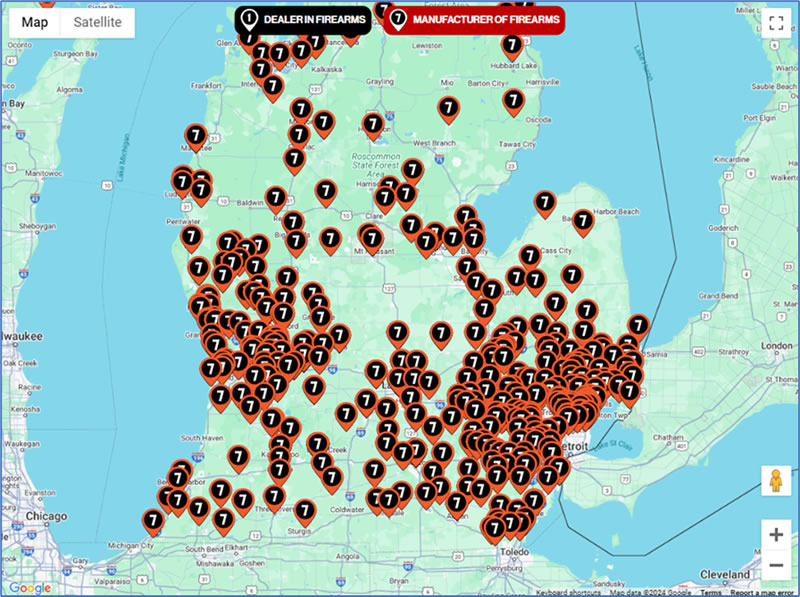
Conclusion and Recommendations
The proliferation of licensed firearm manufacturers poses a significant threat to public safety. Our research suggests that a significant proportion of licensed manufacturers obtained the Type 07 license to exploit the privileges granted to licensees rather than to operate a legitimate business. In addition, a significant number of manufacturers are located in residential areas, some near schools. Below are recommendations to reduce the number of illegitimate licensed manufacturers and help ensure that licensees comply with relevant laws and regulations.
General State and Local Recommendations
- State and local jurisdictions should review FFL holders in their state/community to ensure that they are in compliance with all tax, zoning, business licensing laws, and other relevant regulations.
- States, and where possible local jurisdictions, should implement new standards for manufacturers to decrease the number of Type 07 license holders who have obtained the license for personal use.
- States should establish manufacturer licensing requirements, including the authority to routinely inspect licensees.
- A registry of Type 07 FFL holders should be available, preferably in map form, on local government websites to further inform the public of firearms manufacturing and exporting within residential and other sensitive areas.
Federal Recommendations
- The fees for a Type 07 manufacturer’s license should be increased significantly. The fees for the Special Occupancy Tax (SOT) should also be increased. The fees should also be indexed for inflation.
- Repeal the current restrictions limiting the Bureau of Alcohol, Tobacco, Firearms and Explosives (ATF) to one inspection in a 12-month period and allow ATF to conduct routine inspections of licensed manufacturers.
- The issuance of Type 07 manufacturers’ licenses should be restricted to entities with locations zoned for industrial activities. No licenses should be issued to persons operating from residential locations.
- Manufacturers should be required to routinely submit proof to federal, state, and local authorities demonstrating that the manufacturing facility is in compliance with all applicable zoning laws.
- ATF should ensure that all manufacturers are supplying accurate reports of firearm production and export.
- Further research should be conducted examining the practice of Type 07 license holders with an SOT obtaining or building “dealer sample” machine guns for government agencies (for example, local law enforcement) when, in fact, the weapons are obtained/manufactured for personal use by the license holder.
- Firearms Commerce in the United States: Annual Statistical Update 2021, Bureau of Alcohol, Tobacco, Firearms and Explosives, https://www.atf.gov/firearms/docs/report/2021-firearms-commerce-report/download; Federal Firearms Listings, Bureau of Alcohol, Tobacco, Firearms and Explosives, https://www.atf.gov/firearms/listing-federal-firearms-licensees.
- The most recent year for which both Type O7 license information and firearm production numbers were available at time of writing.
- See https://www.atf.gov/explosives/2022-annual-firearms-manufacturers-and-export-report-afmer.
- See https://www.atf.gov/explosives/2022-annual-firearms-manufacturers-and-export-report-afmer.
- See https://www.atf.gov/explosives/2022-annual-firearms-manufacturers-and-export-report-afmer.
- The most recent year for which both Type O7 license information and firearm production numbers were available at time of writing.
- See https://www.atf.gov/firearms/listing-federal-firearms-licensees.
- See Federal Firearms Listings, https://www.atf.gov/firearms/listing-federal-firearms-licensees.
- See Federal Firearms Listings, https://www.atf.gov/firearms/listing-federal-firearms-licensees.
- 18 USC § 921 (a)21); 18 USC § 922 (a)(1).
- The current dramatic increase in Type 07 manufacturer license holders mirrors a similar increase in Type 01 dealer license holders that occurred at the end of the last century.
The 1992 Violence Policy Center study More Gun Dealers Than Gas Stations (https://vpc.org/wp-content/uploads/2020/03/More-Gun-Dealers-Than-Gas-Stations-1992.pdf) revealed that from 1975 to 1992 the number of Type 01 FFLs ballooned from 146,429 to 245,000 — an increase of 67 percent. The licenses were so easily obtained from ATF that at the time of the study’s release the number of Americans who possessed a Type 01 FFL was greater than the number of gas stations across the nation: 245,000 compared to 210,000. The bulk of the licenses were held by “kitchen-table” dealers. These license holders operated out of their homes or offices, as opposed to storefront gun dealers (commonly known as “stocking dealers”). Of these kitchen-table dealers, an unknown percentage were actively involved in criminal gun sales as well as illegal firearms trafficking.
In response to the widespread abuse of Type 01 FFLs and at the urging of the Violence Policy Center, the Clinton Administration began strictly enforcing the requirement that license holders be “engaged in the business” of selling firearms as required by federal statute. In addition, the 1994 Brady Law implemented many of the recommendations the VPC laid out in its 1992 study. Additional requirements were contained in the 1994 Violent Crime Control and Law Enforcement Act. Heightened ATF scrutiny, both at the time of issuance and renewal, sent a message to the firearms community (both law-abiding and criminal) that the days when a dealer’s license could be obtained with virtually unquestioned ease had come to an end. At the same time, state and local jurisdictions began focusing on kitchen-table dealers via a wide range of enforcement mechanisms (e.g., instituting their own standards for license eligibility, enforcing zoning and business laws, and conducting onsite inspections of licensees’ “place of business”). As a result of these enforcement efforts, the number of Type 01 FFLs in the United States has dropped 76 percent — from 213,734 in 1994 to 51,855 in 2022. It remains to be seen whether a rule implemented by the Biden Administration in 2024 to force more people to obtain gun dealer licenses will have the intended effect of enhancing public safety or whether the unintended consequence will be a return to the days when there were more gun dealers than gas stations and corrupt gun dealers were associated with a shockingly large volume of illegally trafficked firearms. - 26 USC §5845(f) defines the term “destructive device” as “(1) any explosive, incendiary, or poison gas (A) bomb, (B) grenade, (C) rocket having a propellent charge of more than four ounces, (D) missile having an explosive or incendiary charge of more than one-quarter ounce, (E) mine, or (F) similar device; (2) any type of weapon by whatever name known which will, or which may be readily converted to, expel a projectile by the action of an explosive or other propellant, the barrel or barrels of which have a bore of more than one-half inch in diameter, except a shotgun or shotgun shell which the Secretary finds is generally recognized as particularly suitable for sporting purposes; and (3) any combination of parts either designed or intended for use in converting any device into a destructive device as defined in subparagraphs (1) and (2) and from which a destructive device may be readily assembled.”
- See https://www.ffl123.com/.
- See FFL & Class 3 License Guides, FFL123, downloaded May 2023, in files of Violence Policy Center.
- An applicant/license holder can qualify for a “reduced” rate of $500 per year if the license holder’s total income (“not just receipts relating to the activity subject to special occupational tax”) for the tax year is less than $500,000.
- “Special Tax Registration and Return National,” Bureau of Alcohol, Tobacco, Firearms and Explosives, https://www.atf.gov/firearms/docs/form/special-tax-registration-and-return-national-firearms-act-atf-form-56307/download.
- “The Ultimate Guide to SOT,” FFL123 blog, November 24, 2021, https://www.ffl123.com/the-ultimate-guide-to-sot/#Class_1_SOTs.
- “Who Can Own a Full-Auto Machine Gun?,” FFL123 blog, July 2, 2021, https://www.ffl123.com/who-can-own-a-full-auto-machine-gun/.
- FFL & Class 3 License Guides, FFL123, downloaded May 2023, in files of Violence Policy Center.
- Firearms Compliance Inspection Results: Monthly Data, Bureau of Alcohol, Tobacco, Firearms, and Explosives, last review date of April 2, 2024, https://www.atf.gov/firearms/firearms-compliance-inspection-results; Report of Active Firearms Licenses — License Type by State Statistics, Bureau of Alcohol, Tobacco, Firearms, and Explosives, December 10, 2021, https://www.atf.gov/firearms/docs/undefined/ffltypebystate12-10-2021pdf/download.
- Firearms Compliance Inspection Results: Monthly Data, Bureau of Alcohol, Tobacco, Firearms, and Explosives, last review date of April 2, 2024, https://www.atf.gov/firearms/firearms-compliance-inspection-results; Report of Active Firearms Licenses — License Type by State Statistics, Bureau of Alcohol, Tobacco, Firearms, and Explosives, December 10, 2021, https://www.atf.gov/firearms/docs/undefined/ffltypebystate12-10-2021pdf/download.
- 18 USC § 923(d)(1)(F).
- RocketFFL, A Complete Guide to Getting your FFL in Michigan (MI), downloaded September 18, 2024, https://rocketffl.com/ffl-michigan/#.
- All grammatical errors in original.
- FFL123.com, How to Get FFL in Michigan (MI)?, https://www.ffl123.com/how-to-get-ffl-in-michigan/, downloaded February 10, 2025.
- See MCL 28.429 and MCL 28.435.
- The SOT for a manufacturer is $1,000.00 unless the licensee has total gross annual receipts of less than $500,000 (not just receipts for the activity subject to the SOT), in which case the SOT is $500.00.
- Firearms subject to the registration requirement of the National Firearms Act are: (1) a shotgun having a barrel or barrels of less than 18 inches in length; (2) a weapon made from a shotgun if such weapon as modified has an overall length of less than 26 inches or a barrel or barrels of less than 18 inches in length; (3) a rifle having a barrel or barrels of less than 16 inches in length; (4) a weapon made from a rifle if such weapon as modified has an overall length of less than 26 inches or a barrel or barrels of less than 16 inches in length; (5) any other weapon, as defined in subsection (e); (6) a machinegun; (7) any silencer (as defined in section 921 of title 18, United States Code); and (8) a destructive device.
- RocketFFL, SOT License Guide (2024)-Everything You Need to Know, https://rocketffl.com/what-is-an-sot/, downloaded February 2, 2025.
- M. Att’y Gen. Op. No. 7183 (December 27, 2005).
- M. Att’y Gen. Op. No 7260 (September 2, 2011), MCL 750.224(1)(b).
